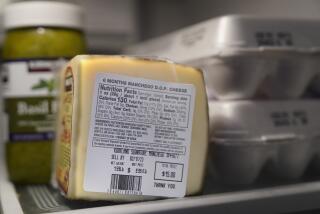Mishandled Food Gifts Can Spoil Holidays
- Share via
If you have a TV set, a telephone, or better yet, a home computer with Internet access, along with a credit card, you may never have to leave your house to go shopping again. There are countless catalogs offering mail-order purchasing of everything imaginable, televised home-shopping services, and the Internet, which takes you to dozens of virtual malls and lets you buy at major department stores, florists and most of the catalog publishers.
Dial a toll-free number or locate the right Web site, order what you want, have it shipped anywhere you say, charge it to your credit card, and bingo: shopping completed! And you can do this 24 hours a day, seven days a week.
If you start this process early enough, you can sail calmly through the holidays, with enough energy left over to enjoy them. Even last-minute shopping is possible and easy, although the later it gets, the more backed up the shipping process becomes.
Food gifts have become popular over the last few years, especially for people who live far away or are difficult to match with gifts.
If you decide to send perishable food as a holiday gift, there are a few things you should remember to make sure your gift arrives in edible condition. There are also a few pieces of advice to heed in case you receive some goodies through the mail.
* Try to deal with established, reputable companies. If a product must be kept cold or frozen, try to find out what provisions the company makes for this. Because the Internet offers no human contact, you might want to find a toll-free customer service number, just to check. If you can, it’s probably worth the extra cost to get overnight shipment.
* Even though it may ruin the surprise, find out when the package will arrive and make sure the recipients will be home to receive it. If the gift is something that needs to be refrigerated or frozen immediately upon arrival, make sure that the shipper clearly labels it that way.
* Try not to send the most highly perishable foods to the warmest parts of the country. For example, Aunt Rose in Palm Springs might be better served by a tin of fancy mixed nuts than a strawberry cheesecake. If you receive perishable food through the mail, check it carefully before you eat it. Make sure it shows no obvious signs of spoilage.
* If you did send a cheesecake to Aunt Rose, it should arrive fully frozen. Tell Aunt Rose to notify you or the shipper immediately if it is not.
* Any meat, poultry or fish should arrive frozen (at least in the middle) or it should have been kept cold (below 40 degrees). Any foods labeled “keep refrigerated” should be cold when they arrive.
* Cheese should not be moldy when you open it, unless, of course, it is supposed to be served that way. If you find mold on a large wheel or wedge of cheese, cut the mold off, along with a big hunk around and underneath the mold. Small pieces of cheese that are questionable should be discarded.
* If somebody sent you fresh (not canned) caviar, it must have been kept thoroughly cold throughout the shipping process. (Fortunately, few of us have to worry about receiving rotting caviar.) If you have any doubt that it hasn’t been kept cold, don’t eat it; don’t even taste it.
* Try to make your gift selection appropriate for the recipient. People who live alone may have difficulty using up a whole turkey or three-dozen oranges. If you receive more than you can use, pass the food along to a local homeless shelter.
* Most mail-order companies have customer service numbers. Don’t hesitate to call them and try to resolve any problems that occur. It is a good idea to keep a list of what you sent to whom, along with the appropriate phone number for that company. If you are dissatisfied with the condition of a shipment you receive, don’t be embarrassed to tell the person who purchased the gift for you. He or she may want to avoid using that company in the future.
* If you have any doubts about the condition or safety of meat or poultry you receive, the U.S. Department of Agriculture offers a toll-free consumer hotline, available 7 a.m. to 1 p.m. PST at (800) 535-4555. Its Web site is https://www.fsis.usda.gov/oa/pubs/mailorder.htm.
So pull out your credit card, flip through that catalog, surf the Net, recharge your touch-tone phone, and shop until you drop. Just start early and keep track of what you have bought. Otherwise, those credit card bills can be scary at the end of the month.
And speaking of credit cards, you shouldn’t have to worry about giving out your number to reputable companies and Web sites. Most of them encrypt the information, and if you do experience fraudulent use of your number, let the credit card company know immediately so you won’t be charged for unauthorized purchases.
*
Dr. Sheldon Margen is a professor of public health at UC Berkeley; Dale A. Ogar is managing editor of the UC Berkeley Wellness Letter. Send questions to Dale Ogar, School of Public Health, UC Berkeley, Berkeley, CA 94720-7360, or e-mail to daogar@uclink4.berkeley.edu. Eating Smart appears the second and fourth Mondays of the month.
More to Read
Eat your way across L.A.
Get our weekly Tasting Notes newsletter for reviews, news and more.
You may occasionally receive promotional content from the Los Angeles Times.







